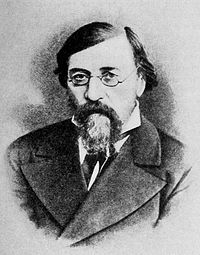| Revision as of 19:21, 31 March 2011 editINeverCry (talk | contribs)59,239 edits added higher res portrait← Previous edit | Revision as of 02:26, 5 April 2011 edit undoBwmcmaste (talk | contribs)1,120 edits add expand template (article very small)Next edit → | ||
| Line 1: | Line 1: | ||
| {{Additional citations|date=January 2011}} | {{Additional citations|date=January 2011}} | ||
| {{Expand|date=April 2011}} | |||
| {{Redirect|Chernyshevsky}} | {{Redirect|Chernyshevsky}} | ||
Revision as of 02:26, 5 April 2011
| This article needs additional citations for verification. Please help improve this article by adding citations to reliable sources. Unsourced material may be challenged and removed. Find sources: "Nikolay Chernyshevsky" – news · newspapers · books · scholar · JSTOR (January 2011) (Learn how and when to remove this message) |
The template {{Expand}} has been deprecated since 26 December 2010, and is retained only for old revisions. If this page is a current revision, please remove the template.
"Chernyshevsky" redirects here. For other uses, see Chernyshevsky (disambiguation).Nikolay Chernyshevsky
 | |
|---|---|
| Born | (1828-07-12)July 12, 1828 Saratov, Russia |
| Died | October 17, 1889(1889-10-17) (aged 61) Russia |
Nikolay Gavrilovich Chernyshevsky (Template:Lang-ru) (July 12, 1828 – October 17, 1889) was a Russian revolutionary democrat, materialist philosopher, critic, and socialist (seen by some as a utopian socialist). He was the leader of the revolutionary democratic movement of the 1860s, and an influence on Vladimir Lenin, Emma Goldman, and Serbian political writer and socialist Svetozar Marković.
Biography
The son of a priest, Chernyshevsky was born in Saratov in 1828, and stayed there till 1846. After graduating from Saint Petersburg University in 1850, he taught literature at a gymnasium in Saratov. From 1853 to 1862, he lived in Saint Petersburg, and became the chief editor of Sovremennik ("Contemporary"), in which he published his main literary reviews and his essays on philosophy.
In 1862, he was arrested and confined in the Fortress of St. Peter and Paul, where he wrote his famous novel What Is to Be Done? The novel was an inspiration to many later Russian revolutionaries, who sought to emulate the novel's hero, who was wholly dedicated to the revolution, ascetic in his habits and ruthlessly disciplined, to the point of sleeping on a bed of nails and eating only meat in order to build strength for the Revolution. Among those who have referenced the novel include Lenin, who wrote a work of political theory of the same name. In 1862, Chernyshevsky was sentenced to civil execution (mock execution), followed by penal servitude (1864-72), and by exile to Vilyuisk, Siberia (1872-83). He died at the age of 61.
Influence

Chernyshevsky was a founder of Narodism, Russian populism, and agitated for the revolutionary overthrow of the autocracy and the creation of a socialist society based on the old peasant commune.
Chernyshevsky's ideas were heavily influenced by Alexander Herzen, Vissarion Belinsky, and Ludwig Andreas Feuerbach. He saw class struggle as the means of society's forward movement and advocated for the interests of the working people. In his view, the masses were the chief maker of history. He is reputed to have used the phrase "the worse the better", to indicate that the worse the social conditions became for the poor, the more inclined they would be to launch a revolution.
According to Professor Emeritus of Slavic and Comparative Literature at Stanford, Joseph Frank, "Chernyshevsky's novel What Is to Be Done?, far more than Marx's Das Kapital, supplied the emotional dynamic that eventually went to make the Russian Revolution".
Works about Chernyshevsky
- Vladimir Nabokov's The Gift has the protagonist, Fyodor Godunov-Cherdyntsev, study Chernyshevsky and write the critical biography The Life of Chernychevski which represents Chapter Four of the novel. The publication of this work causes a literary scandal.
- Paperno, Irina, Chernyshevsky and the Age of Realism: A Study in the Semiotics of Behavior. Stanford: Stanford University Press, 1988.
- Pereira, N.G.O., The Thought and Teachings of N.G. Černyševskij. The Hague: Mouton, 1975.
Works
- Aesthetic Relations of Art to Reality
- Essays on the Gogol Period in Russian Literature
- Critique of Philosophical Prejudices Against Communal Ownership
- The Anthropological Principle in Philosophy
- What Is to Be Done? (1863)
- Prologue
- The Nature of Human Knowledge
References
- Amis, Martin (2002). Koba the Dread. Miramax. p. 27. ISBN 0786868767.
- The Gift chapter 5
External links
| People from Russia | |||||
|---|---|---|---|---|---|
| Political leaders |
| ||||
| Military figures and explorers | |||||
| Scientists, engineers and inventors | |||||
| Artists and writers | |||||
| Religious leaders | |||||
| Sportspeople | |||||